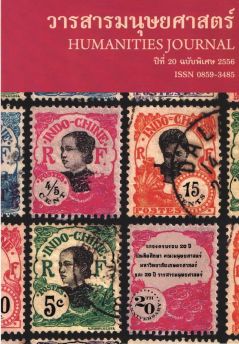ทัศนคติของนิสิตระดับอุดมศึกษาต่อการใช้ภาษาของอาจารย์
Main Article Content
Abstract
งานวิจัยนี้มีวัตถุประสงค์เพื่อศึกษาทัศนคติของนิสิตระดับอุดมศึกษาต่อการใช้ภาษาจองอาจารย์ กลุ่มตัวอย่างประกอบด้วยนิสิตระดับปริญญาตรี 270 คน และนิสิตระดับบัณฑิตศึกษา 153 คน การเก็บข้อมูลทำโดยใช้แบบสอบถามออนไลน์ซึ่งประกอบด้วย 4 สถานการณ์จำลอง ซึ่งในสถานการณ์เหล่านั้นอาจารย์ได้แจ้งข่าวหรือตอบคำถามนิสิตผ่านเครือข่ายสังคม www.facebook.com กลุ่มตัวอย่างจะต้องจินตนาการว่าตนเป็นหนึ่งในนิสิตเหล่านั้นและประเมินลักาณะต่างๆ ของอาจารย์แต่ละท่านในด้านความสุภาพ ความเป็นมิตร ความฉลาด สถานะทางสังคม หน้าตา และความซื่อสัตย์
ผลการศึกษาในภาพรวมพบว่า นิสิตมีทัศนคติที่ดีกว่าต่ออาจารย์ที่ใช้ภาษาเป็นทางการ เรียกนิสิตด้วยชื่อจริง หรือใช้คำลงท้ายบอกความสุภาพตามเพศของตนมากกว่าตามเพศของนิสิต และในกรณีที่อาจารย์ใช้คำลงท้ายตามเพศของนิสิต นิสิตมีทัศนคติที่ดีต่ออาจารย์หญิงที่ใช้คำลงท้ายตามเพศของนิสิต นิสิตมีทัศนคติที่ดีต่ออาจารย์หญิงที่ใช้คำลงท้ายตามเพศของนิสิตชายมากกว่าอาจารย์ทั้งชายและหญิงที่เรียนตนเองว่า "อาจารย์" มากกว่าอาจารย์ที่เรียกตัวเองว่า "ครู" และ "ดิฉัน/ผม" อาจารย์ที่เรียกตนเองว่า "ครู" ได้รับการตัดสินว่ามีความเป็นมิตรสูงที่สุด นิสิตระดับปริญญาตรีมีทัศนคติที่ดีต่ออาจารย์ไม่ว่าในการใช้ภาษารูปแบบใดมากกว่านิสิตระดับบัณฑิตศึกษา นอกจากนั้นนิสิตระดับปริญญาตรียังมีทัศนคติที่แตกต่างกันระหว่างการที่อาจารย์ใช้ภาษาในรูปแบบต่างๆ มากกว่าในกรณีของนิสิตระดับบัณฑิตศึกษาด้วย
Attitude of University Students toward Language Use of Lecturers
M.L. Jaralvilai Charunrochana
The objective of this research is to study the attitude of university students toward language use of lecturers. The sample comprises 270 undergraduate students and 153 graduate students. The data was collected by online questionnaire consisting of 4 fictive situations on www.facebook.com in which lecturers informed or answered their students. The samples were asked to imagine being one of those students and to evaluate each lecturer's character traits such as politeness, friendliness, social status, good look and honesty.
The findings show that students have better attitude toward lecturers who use formal style of writing, call their students by given names, or use final particles according to their own gender rather than to their students' gender. Students have better attitude toward female lecturers using male final particle to male students than male lecturers using female final particles to female students. Students have better attitude toward lecturers who call themselves "acharn" than "khru" or "dichan/phom". Lecturers calling themselves "khru" are rated being most friendly. Undergraduate students rate their lecturers higher than
graduated students in general. Moreover, there is greater difference in evaluations of lecturers with different styles of language use for undergraduate students than graduated students.


